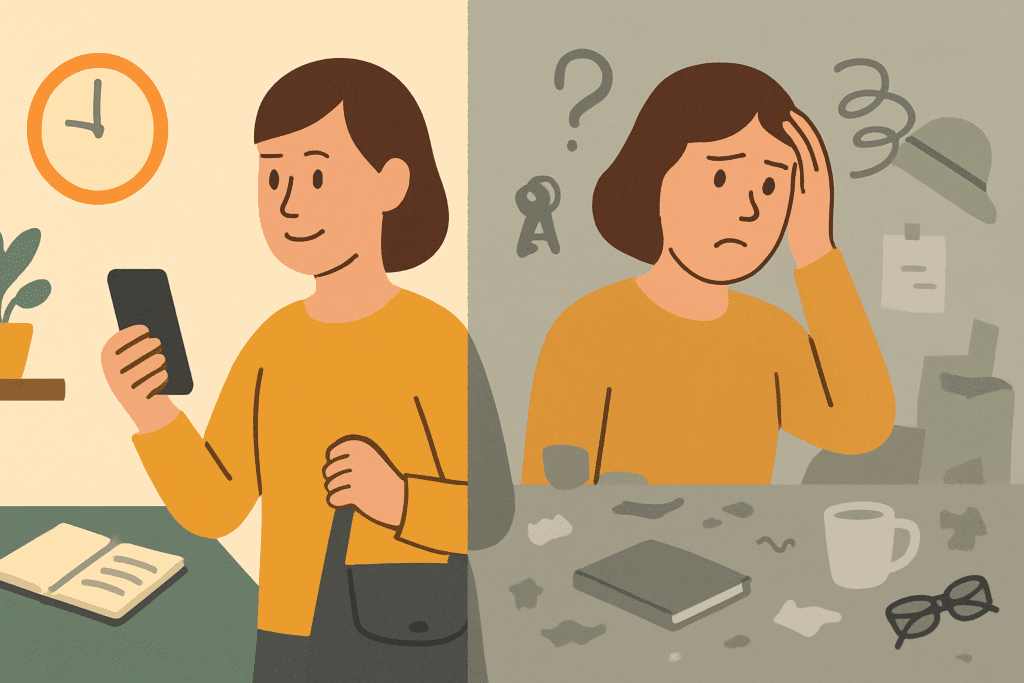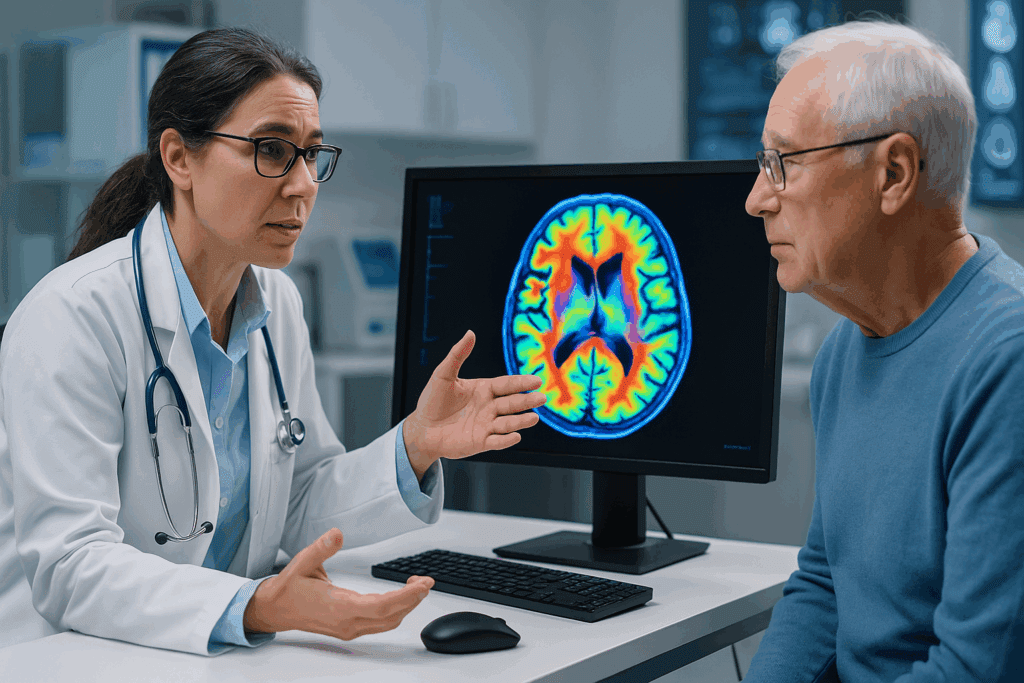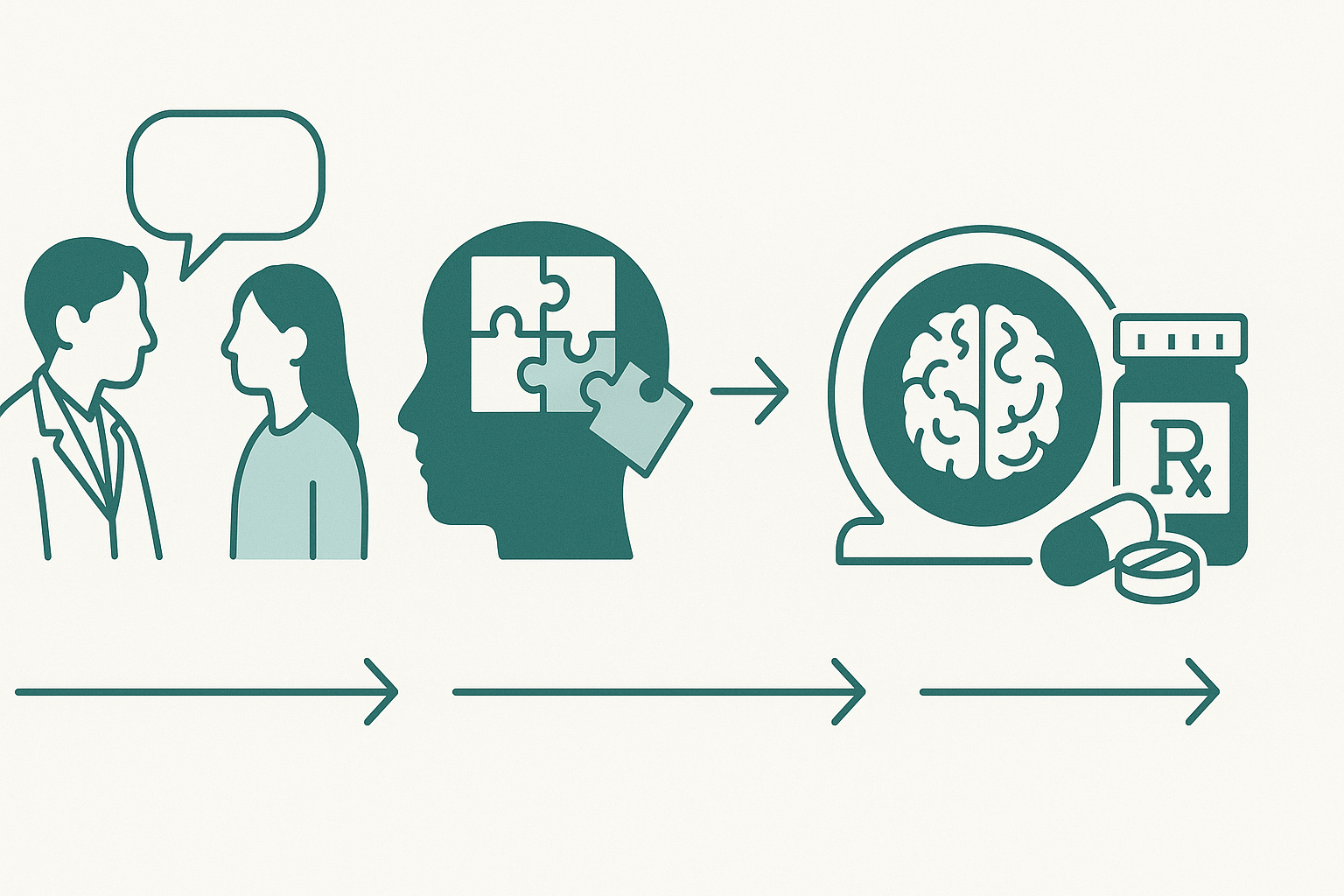Memory is fundamental to our personal identity, academic success, professional competence, and everyday functioning. Yet, millions of people experience disruptions in memory that can range from occasional forgetfulness to more serious cognitive issues. When this happens, it raises a pivotal question: what type of doctor should I see for memory problems? In this comprehensive guide, we will explore the medical professionals who specialize in diagnosing and treating memory-related issues while offering an in-depth look at how nutrition, lifestyle, and natural ingredients can support memory and overall brain health. Our aim is to blend expert-backed medical advice with holistic, evidence-based strategies for cognitive enhancement.
You may also like: Best Herb for ADHD Support: How Natural Remedies and Herbs for ADHD Women May Help Boost Focus and Calm
Understanding Memory Issues and When to Seek Help
Everyone forgets things from time to time. Misplacing keys or momentarily forgetting a name is common and typically harmless. However, when memory lapses become frequent, interfere with daily life, or are accompanied by confusion, disorientation, or changes in personality, it’s essential to seek medical evaluation. These could be signs of deeper neurological or psychological conditions, including early stages of Alzheimer’s disease, mild cognitive impairment (MCI), depression-related memory issues, or side effects from medications.
Knowing when to act can be lifesaving. Early intervention often results in better outcomes, and recognizing these signs is the first step toward effective management. If you’re unsure, asking yourself, “What type of doctor should I see for memory problems?” is a valuable starting point. Many individuals delay care, assuming their symptoms are simply part of aging, but a timely consultation with the right specialist can provide clarity and open pathways to treatment and support.

What Is a Memory Doctor Called?
When patients begin searching for the right professional to consult, they often wonder, “What is a memory doctor called?” The answer isn’t always straightforward, as several types of physicians and specialists may be involved in diagnosing and treating memory issues, depending on the underlying cause. A neurologist is often the go-to specialist for memory loss. Neurologists are trained in conditions that affect the brain and nervous system and are well-versed in disorders such as dementia, stroke, and Parkinson’s disease.
In some cases, a geriatrician – a doctor specializing in elderly care – may be the most appropriate choice, especially for older adults experiencing age-related memory decline. For those whose memory problems stem from mood disorders like anxiety or depression, a psychiatrist may be best equipped to help. Neuropsychologists also play a critical role by conducting detailed cognitive assessments that help pinpoint the nature and extent of memory dysfunction. So, if you’re searching for a doctor for memory loss, you may be referred to one of these experts based on your symptoms and health history.

How Doctors Diagnose and Treat Memory Problems
After you’ve decided what type of doctor for memory loss is right for you, the diagnostic journey typically begins with a comprehensive medical history and physical exam. The doctor will ask about the onset and nature of your symptoms, medications, lifestyle habits, and any family history of memory disorders. A neurologist or other memory specialist may then order imaging studies like an MRI or CT scan to look for structural abnormalities in the brain. Blood tests might be conducted to rule out vitamin deficiencies, thyroid problems, or infections.
Cognitive assessments are a cornerstone of diagnosing memory issues. These range from simple recall tests in the clinic to extensive neuropsychological evaluations that assess memory, attention, language, and problem-solving skills. The resulting profile can help distinguish between different types of cognitive impairment, such as MCI versus Alzheimer’s disease. Once the diagnosis is clear, treatment plans can be developed and may include medication, cognitive therapy, or lifestyle adjustments.
Common Reasons People Seek a Doctor for Memory Issues
There are many reasons why someone might look for a doctor for memory issues. Persistent forgetfulness, difficulty performing familiar tasks, confusion with time or place, trouble following conversations, or frequent misplacement of objects can all indicate underlying concerns. For students and professionals, memory problems might manifest as trouble studying, retaining new information, or recalling learned material. In such cases, questions like “How to memorize for exams” or “How to remember information for a test” become urgent and emotionally charged.
People often find themselves trying to improve memory through sheer willpower or untested supplements. But when problems persist, it’s critical to consult a medical professional. Whether you’re experiencing memory challenges yourself or supporting a loved one who is, identifying the right “dr for memory problems” is a crucial step toward recovery and resilience.

What Type of Doctor Should I See for Memory Problems?
This question becomes especially urgent when symptoms affect daily function. If you’re not sure where to begin, start with your primary care physician. They can perform an initial evaluation and refer you to a specialist if needed. As mentioned earlier, neurologists, geriatricians, psychiatrists, and neuropsychologists are among the top professionals involved in managing memory problems. The decision depends on your age, medical background, and specific symptoms.
Those asking, “What type of doctor should I see for memory problems?” often benefit from a multidisciplinary approach. A primary care doctor might refer a patient to a neurologist for a brain scan, a neuropsychologist for cognitive testing, and a psychiatrist for mood evaluation. This collaboration ensures that all aspects of brain health are explored and addressed holistically.
Natural Approaches to Support Memory and Brain Health
While medical consultation is essential, many individuals are also interested in natural ways to enhance cognitive function. Diet plays a pivotal role here. Nutrients like omega-3 fatty acids, B-vitamins, and antioxidants support neuroplasticity and protect brain cells from oxidative stress. Foods like fatty fish, blueberries, walnuts, turmeric, and leafy greens are all linked to better brain performance.
Adaptogens such as Rhodiola rosea, Bacopa monnieri, and Ginkgo biloba have also shown promise in improving mental clarity and reducing cognitive fatigue. These herbs work by modulating stress responses and enhancing neurotransmitter activity, making them particularly useful for people asking how to remember what you read for exams or how to remember stuff when studying. However, it’s important to consult with a healthcare provider before starting any new supplement regimen, especially if you are also taking prescription medications.

Integrating Memory Techniques into Daily Life
Effective memory isn’t solely a matter of biology – it’s also shaped by practice. Students and professionals often search for strategies on how to memorize things fast for exam situations or how to memorize something for a test under pressure. Proven techniques include spaced repetition, visualization, and the use of mnemonic devices. These strategies tap into the brain’s natural learning mechanisms and help anchor new information in long-term memory.
Mindfulness and meditation can also enhance concentration and reduce mental clutter, making it easier to focus and retain new knowledge. Physical exercise, sleep hygiene, and social interaction further support memory by enhancing blood flow to the brain, promoting neural growth, and improving mood. Together, these strategies provide a robust toolkit for those eager to learn how to remember things while studying more effectively.
When Memory Problems Signal Something More Serious
While occasional forgetfulness is usually harmless, persistent memory problems may point to more serious conditions. Alzheimer’s disease, vascular dementia, traumatic brain injuries, and even autoimmune disorders can impair memory significantly. In these cases, identifying the right doctor for memory loss is critical to receiving timely and accurate treatment.
The earlier such conditions are diagnosed, the better the chances of slowing progression. This is why repeated concerns about memory should never be dismissed. If you’ve been wondering what type of doctor for memory loss can help diagnose these conditions, a neurologist is typically the most appropriate specialist, though geriatricians and psychiatrists may also be involved in long-term care.
Lifestyle, Prevention, and Long-Term Brain Health
Prevention is as valuable as treatment. A brain-healthy lifestyle includes regular physical activity, a diet rich in antioxidants and healthy fats, adequate sleep, stress management, and lifelong learning. Engaging in new activities and maintaining curiosity are powerful ways to build cognitive reserve, the brain’s ability to adapt to damage and age-related decline.
For students and professionals preparing for high-stakes environments, the same principles apply. To improve recall and performance, understanding how to remember information for a test, how to memorize for exams, and how to memorize something for a test is essential. Natural support from brain-boosting herbs and foods can be a helpful complement to evidence-based study strategies.

Frequently Asked Questions: Navigating Memory Problems and Choosing the Right Doctor
What makes a neurologist different from other doctors when it comes to memory loss?
A neurologist has specialized training in diseases of the brain and nervous system, which makes them uniquely equipped to diagnose complex memory conditions. While a primary care physician can evaluate basic symptoms, a neurologist uses detailed neurological exams, brain imaging, and lab tests to explore potential causes of memory disruption. This specialty allows them to detect subtle signs of neurodegenerative diseases before they significantly impair daily life. When determining what type of doctor for memory loss may be most effective, neurologists stand out for their ability to differentiate between Alzheimer’s, vascular dementia, and other cognitive disorders. Therefore, they often serve as the first referral when someone sees a doctor for memory loss with unexplained symptoms.
Is it necessary to see more than one type of doctor for memory problems?
In many cases, yes. Memory loss can stem from various causes, including psychological issues, sleep disorders, hormonal imbalances, and neurological degeneration. Because of this, a multidisciplinary approach involving multiple professionals may provide the most comprehensive care. For instance, after consulting a neurologist, patients may also work with a psychiatrist or an endocrinologist, depending on the findings. If you’re still wondering what type of doctor should I see for memory problems when symptoms are vague or overlap, the best course is to start with a general practitioner who can coordinate referrals.
How can you tell if memory loss is serious enough to see a specialist?
Memory changes are common with age, but certain red flags suggest the need for professional evaluation. If you notice repeated disorientation, frequent repetition of questions, or a sudden decline in problem-solving abilities, it’s wise to contact a doctor for memory issues. Early intervention leads to better outcomes and can help differentiate between temporary conditions like stress and progressive ones like dementia. If your symptoms are persistent or worsening, your primary care provider can determine what type of doctor for memory loss is appropriate based on clinical context. Seeing a specialist early allows for diagnosis while treatments and lifestyle interventions are most effective.
Can a psychiatrist be a memory doctor?
Absolutely. While most people associate psychiatrists with mood disorders, these professionals are also trained to evaluate cognitive decline caused by psychological or neurochemical changes. Depression, anxiety, and even trauma can mimic or exacerbate memory loss, particularly in older adults. A psychiatrist can assess whether mood-related factors are contributing to forgetfulness and determine whether the issue warrants further neurological evaluation. So, if you’re unsure what is a memory doctor called when emotional health is part of the puzzle, a psychiatrist might be the best first step.
What should I expect during my first visit to a doctor for memory problems?
Expect a detailed conversation about your symptoms, lifestyle, medical history, and mental health. A doctor for memory loss will typically begin with simple cognitive assessments before recommending blood tests or brain scans. You may be asked to recall words, complete patterns, or describe recent events to test short-term memory. If you’re referred to a specialist, such as a neurologist, these evaluations become more in-depth. Knowing what type of doctor should I see for memory problems beforehand can help you prepare for specific tests or bring relevant medical documents.
Are there any emerging trends in diagnosing memory issues?
Yes, new technologies are reshaping the way professionals diagnose cognitive disorders. Artificial intelligence and machine learning algorithms are being integrated into imaging tools to detect early brain changes associated with dementia. Salivary and blood biomarkers are also being studied for their ability to reflect real-time cognitive health. If you’re curious about what type of doctor for memory loss stays on the cutting edge, many academic neurologists and researchers are embracing these technologies. This allows for more precise and earlier interventions than traditional methods.
Can natural approaches complement medical treatment for memory loss?
Natural interventions such as dietary changes, herbal supplements, and cognitive training can support brain health when used under professional guidance. While these strategies shouldn’t replace medical evaluations, they can play a supportive role in comprehensive care. For example, omega-3 fatty acids and antioxidants have shown promise in reducing inflammation and oxidative stress in the brain. A doctor for memory issues might work alongside a dietitian or naturopath to create an integrative care plan. Always consult a licensed dr for memory problems before beginning any supplement regimen to ensure it doesn’t interfere with prescribed medications.
How do doctors differentiate between age-related memory changes and dementia?
This distinction is made through cognitive testing, medical history, and brain imaging. Age-related forgetfulness tends to involve slower recall but not significant memory gaps or confusion. In contrast, dementia involves pronounced disruption in daily functioning, such as forgetting familiar names, places, or routines. A skilled doctor for memory problems will look for patterns of decline and assess how memory lapses impact social, occupational, and personal domains. If you’re unsure what type of doctor should I see for memory problems that feel borderline, a neuropsychologist can conduct tests tailored to detect subtle cognitive deficits.
What can caregivers do to support loved ones while waiting for a diagnosis?
Patience, organization, and emotional support are key. Caregivers should document behavioral changes, track memory lapses, and prepare information for upcoming appointments. Encouraging routines and minimizing distractions can help reduce confusion during this uncertain time. If you’re accompanying someone to see a doctor for memory loss, having clear observations and timelines can assist in diagnosis. Additionally, understanding what a memory doctor is called and their role in the care team can help you advocate effectively for your loved one.
Are there memory specialists focused on younger patients?
Yes, although memory problems are often associated with aging, younger individuals can also experience cognitive challenges due to stress, autoimmune conditions, or genetic factors. Some neurologists and psychiatrists specialize in early-onset cognitive disorders or neurodevelopmental concerns. If you’re under 50 and experiencing unusual forgetfulness, don’t hesitate to seek out a doctor for memory issues with experience in younger populations. Knowing what type of doctor should I see for memory problems as a younger adult means finding someone familiar with broader differential diagnoses beyond age-related decline.

Final Thoughts on Finding the Right Doctor for Memory Problems and Supporting Brain Health Naturally
In the complex journey of understanding and treating memory challenges, the question “What type of doctor should I see for memory problems?” emerges not only as a gateway to clinical care but also as an opportunity to embrace a broader perspective on brain health. Whether you’re consulting a neurologist, geriatrician, psychiatrist, or neuropsychologist, the insights and treatments these experts provide are vital. Yet, they are most effective when integrated with a proactive, holistic approach that includes proper nutrition, cognitive training, physical activity, and stress management.
Natural strategies, when guided by evidence and used responsibly, offer valuable support to those experiencing memory difficulties. From herbal supplements to memory-enhancing foods, and from mindfulness to structured memorization techniques, the tools are abundant and accessible. For those preparing for exams or struggling with forgetfulness, learning how to remember stuff when studying or how to memorize for exams may involve more than just repetition – it may require a rethinking of lifestyle, brain nutrition, and the role of medical support.
Ultimately, seeking a doctor for memory loss is not a sign of weakness or inevitability; it is a courageous first step toward clarity, confidence, and cognitive empowerment. With the right medical advice, natural interventions, and lifestyle adjustments, improved memory and better brain health are not just possible – they are within reach.


